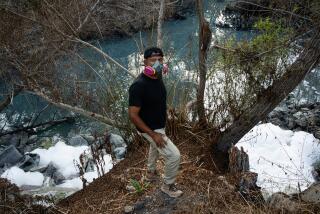Dioxin Risk at Times Beach Was Low, Official Now Says
- Share via
ST. LOUIS — A federal health official who recommended that Times Beach be evacuated because of contamination by the chemical dioxin now says that he no longer views it as the deadly substance it was believed to be.
That change of opinion could influence pending or future lawsuits involving dioxin, parties to the suits say.
Dr. Vernon N. Houk of the federal Centers for Disease Control told the St. Louis Post-Dispatch that if he knew in 1982 what he knows now about the dangers of dioxin, he never would have recommended that the community in southwestern St. Louis County be evacuated.
“I would not be concerned about the levels of dioxin at Times Beach,” Houk said.
Times Beach was abandoned in December, 1982, and bought out by the government. The cleanup of dioxin-tainted soil in the town began last month. The dioxin was contained in waste oil spread on streets to control dust.
Experts estimate that the cleanup at Times Beach, once a town of 2,242 people, will cost $200 million by the time of completion in the year 2000.
Dioxins, a class of chemicals often formed as unwanted byproducts of chemical processes, were once considered by the U.S. Environmental Protection Agency to be “the most toxic man-made chemical.”
But Houk now says that if dioxin is a carcinogen, “it is, in my view, a weak one that is associated only with high-dose exposures.”
Houk is an assistant surgeon general and director of the Center for Environmental Health and Injury Control at the CDC. He spoke this week at the 25th annual Conference on Trace Substances in Environmental Health. Dioxin was a major topic at the conference.
Houk said health studies now show dioxin in low doses to be a minimal health risk in humans. Thus, he said, the evacuation order was an overreaction.
When asked in an interview what he would tell Times Beach residents whose lives were uprooted by the order, Houk said:
“I would tell them when we originally got involved with you, we were very concerned about the substance. But the data we’ve accumulated in the last 10 or 12 years show we should not be that concerned.”
Houk said it is up to the EPA to decide whether to continue with the cleanup.
Karen Webb, director of the division of environmental and occupational health at the St. Louis University School of Medicine, said studies of Times Beach residents found “no significant chronic illness.”
More to Read
Sign up for Essential California
The most important California stories and recommendations in your inbox every morning.
You may occasionally receive promotional content from the Los Angeles Times.













